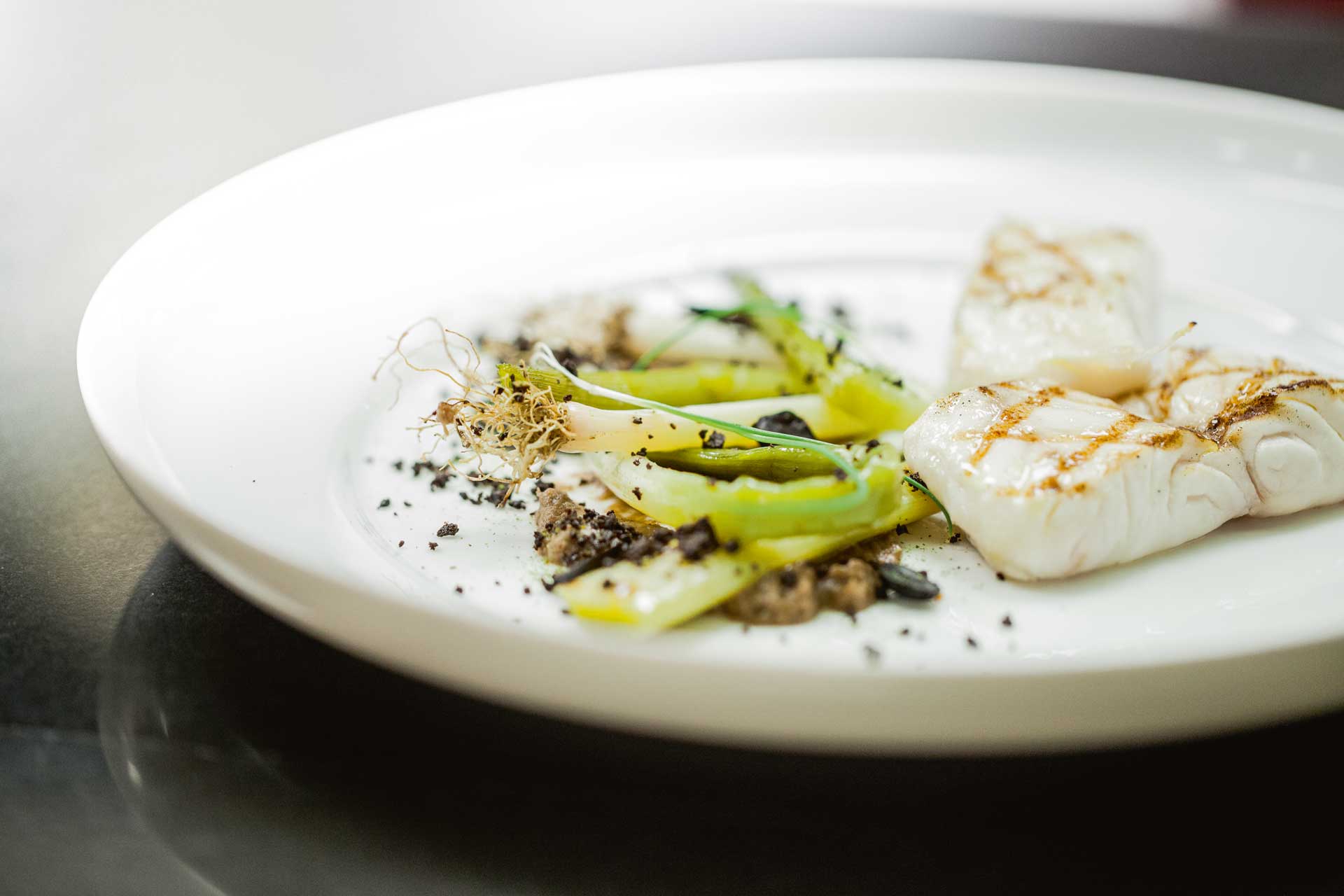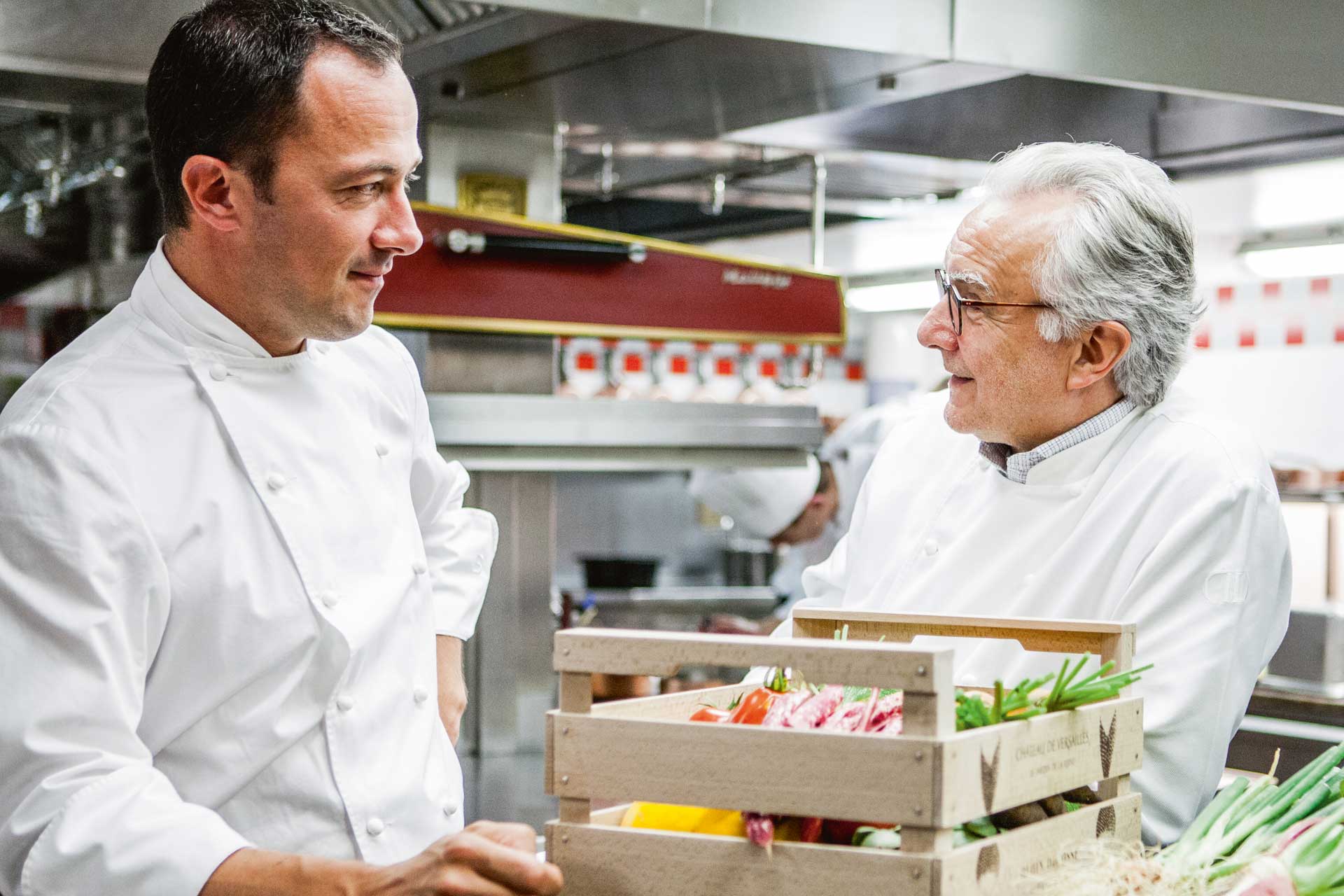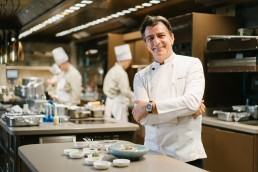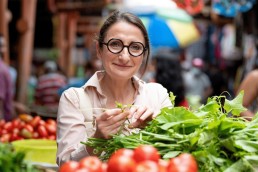After 45 years in the industry Alain Ducasse is still going strong. We speak to the master chef about his enterprises, passion for independent hotels and why he decided to take meat off the menu at his three-Michelin star restaurant in Paris’ Plaza Athenée.
It’s late morning on a Wednesday at The Promenade in London’s Dorchester Hotel. The breakfast service is winding down as the preternaturally calm staff skate between tables pouring final coffees for lingering businessmen and guests. Propped up by a cushion on one of the green settees that lines the centre of the restaurant, it is tempting to be lulled by the hum of activity when, precisely on time, the man himself emerges from a pair of double doors, above which a fixed brass plaque bears his name.
Dressed in a black suit jacket with an open neck shirt – his grey hair smoothly slicked back – Alain Ducasse has the cool, self-possessed demeanour of success. His manner is brusque and as he peers cagily from behind his signature black-rimmed spectacles. It is clear that he is a no-nonsense sort of man. It’s precisely this attitude that has shaped his career, becoming one of the most celebrated chefs in the world and often revered by industry insiders as one of the greats, comparable with legends such as Escoffier, Vergé and Bocuse for his influence over French cuisine.
A veteran who has guided the industry for over 45 years, Ducasse might have swapped his chef whites for more sober business attire a while ago, but far from indulging in long lunches on the other side of the pass, he remains fully immersed, micromanaging all aspects of his projects, from the recipes to the interior design and even the tableware and talent. As a result his lucrative empire – that also includes cooking schools, recipe books and a network of European hotels – has earned him the reputation as one of the wealthiest chefs in the business.
A man from much humbler beginnings, Ducasse grew up on a farm in the southwest region of France. Food was always an important part of his life and he recalls the wholesome flavours of his grandmother’s cooking, prepared with produce straight from the farm, including the vegetables he helped pick from the kitchen garden. “I was surrounded by ducks and geese and had access to some amazing produce such as boletus mushrooms and foie gras,” says Ducasse. “I grew up appreciating these ingredients and learnt to cook with them.”

Of course, an appreciation of food within family life is one thing, but it wasn’t until Ducasse turned 16 that he began to sharpen his skills under the tutelage of masters such as Michel Guérard, Gaston Lenôtre, Roger Vergé and Alain Chapel, while discovering the flavours of Provençal cooking, for which he has now become known.
Following a stint at Vergé’s second restaurant, L’Amandier, and later at Hotel Juana’s La Terrasse, in the southeast of France – where he also gained his first two Michelin stars – his big break came at the age of 33, when he was awarded three Michelin stars while at the helm of Le Louis XV, the restaurant in Monaco’s Hôtel de Paris. A few years later, this was followed by another triple star win at his eponymous restaurant in Paris, making him the first six-star chef in the world.
Two decades and a galaxy of stars later (19 to be precise) Ducasse, to date, has 23 restaurants that span from casual bistros to contemporary French offerings, and of course his signature haute cuisine establishments. Scattered through seven different countries across the globe, it is clear that food lovers from a variety of cultures will flock to a Ducasse dining room for the simple reason that he has successfully translated the essence of French cuisine and service for an international audience, while still retaining a sense of authenticity. “It’s difficult, because you have to preserve your own identity, while showcasing – and allowing people to discover – the French idea of cuisine,” says Ducasse, his white eyebrows knitted together thoughtfully. “It’s about satisfying and matching the expectations of the clientele. I like to say that I have a global vision, but a local expression.”
Indeed, whether serving up contemporary plates such as homemade buckwheat pasta with frog’s legs at Spoon in Hong Kong; comforting home-style dishes like the beef entrecôte and fries in Tokyo’s Benoit; or the deliciously gooey croque monsieur at Ore, his newest café in the Palace of Versailles, Ducasse, over the years, has consistently delivered quintessential French cooking. So it comes as a surprise that this ‘Frenchest’ of French chefs has gone off-piste by removing all meat from the menu at his three-star establishment in Paris’ Hôtel Plaza Athenée. “I wanted to show that, opposite to the image of French cuisine being heavy and complex, it can also be good for your health,” explains Ducasse. “I wanted to prove that you are still able to create haute cuisine using very modest, humble, peasant ingredients such as legumes, cereals and vegetables.” He emphasises: “This isn’t something that happened organically, it is something I feel very strongly about.”
The dishes that emerge from the kitchen, with a kind of military precision only an establishment of this merit can orchestrate, are – simply put – a revelation. Fresh rouget – or red mullet – is spiked with an intense liver sauce; meaty scallops, accompanied with baked cauliflower, are livened up with a sprinkling of earthy black truffle; while a simple wheat and root vegetable concoction is served in Ducasse’s trademark porcelain cookpot, a streamlined reimagining of the traditional version, now designed by Pierre Tachon to lock in flavours during slow cooking. And, as Ducasse says is characteristic of his overall philosophy, “The idea of this dish is to use local, seasonal vegetables, linked to the region they come from. It is representative of what I want to do: to change the way we approach food and consume less meat, fat, sugar and salt.”

The cookpot is just one example of Ducasse’s love of tableware and his microscopic involvement and attention to detail, where nothing – from the music to the thickness of the paper that the menus are printed on – escapes his scrutiny. “I like to make all the decisions,” he affirms in his clipped, matter-of-fact tone. “I am the creator and artistic director of all of the restaurants, which includes the cuisine, but also all the details that are part of the experience. When it comes to tableware, I am really curious about the way people feed themselves around the world. I like to find objects that are different and also to use locally produced items, such as the porcelain at La Bastide.”
By ‘La Bastide’, Ducasse means La Bastide de Moustiers, one of his two hotels in Provence. Housed in a 17th century gem, hidden among fragrant lavender bushes and olive trees, Ducasse describes the hotel as an inn with a few bedrooms and a restaurant. And while this is true, with a Michelin star kitchen run by his protégé, Nicolas Pierantoni, a garden that provides seasonal vegetables, herbs and fruit for the menu, and quaint offerings such as picnic baskets and bicycle rides, the intimate property perfectly sums up Ducasse’s values for regionality and his strong predilection for unique, independent hotels. So much so that in 1998 he purchased an association that was formed, two decades previously, by a group of independent hoteliers. Now called Châteaux & Hôtels Collection, the company represents over 500 boutique hotels and restaurants, mainly throughout France and Italy. “I have been an innkeeper myself for more than 20 years, so I like the idea of independent hotels that are rooted within their regions and have managed to keep their character,” explains Ducasse with a shrug. “With my two Provençal inns, they are all about belonging to the area and understanding where the food and the people come from. They are both full of quirky collected items from local markets and artists, and when you arrive it’s like being welcomed into a big family.” Ducasse’s eyes light up as he discusses the endeavour: “With the Châteaux & Hôtels Collection, I wanted a compilation of European properties that have their own unique characters and personalities. Each must have something different, charming and secret, so that you can go on a journey when visiting them.”
Now in his 60s, you would think taking a step back probably sounds tempting for someone that has been at the forefront of his industry for so many years. Yet Ducasse is a man with an unrelenting desire to remain on the top, and with a list of upcoming projects that, in his words, is too long to mention, we can’t help but wonder what keeps the chef so motivated. “No two days are the same. For me, it’s all about exceeding, getting what is seemingly not possible to get and always wanting more,” he says. “In the modern world, our lives are so full of stress and anxiety. I like to make people feel special and make sure that they walk away with an incredible experience and a great memory. I like to say that I am a pedlar of dreams, memories and emotions.” And with that, a smile finally slides across his face.
CREDITS
Words: Lauren Ho
Headline Image: © Heikki Verdume
Magazine: Supper 6
Related Posts
18 April 2023
A New Level: An interview with Yannick Alléno
17 November 2022



